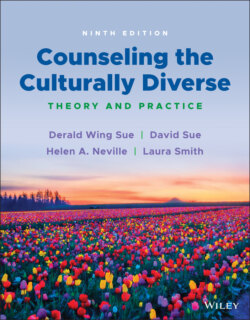Читать книгу Counseling the Culturally Diverse - Laura Smith L. - Страница 28
The Meaning of Anxiety and Fear
ОглавлениеAnxiety is the primary subjective emotion encountered by White trainees exposed to multicultural content and its implications. In one study, it was found that when racial dialogues occurred, nearly all students described fears of verbal participation because they could be misunderstood, or be perceived as racist (Sue, Rivera, et al., 2010). Others went further in describing having to confront the realization that they held stereotypes, biases, and prejudices toward People of Color. This insight was very disturbing and anxiety‐provoking to them because it directly challenged their self‐image as good, moral, and decent human beings who did not discriminate. Facing this potential awareness creates high levels of anxiety, and often results in maneuvers among students to avoid confronting their meanings.
I have a fear of speaking as a member of the dominant group … My feelings of fear stem from not wanting to be labeled as being a racist. I think that fear also stems from the inner fear that I do not want to know what happens to people of color every day. I may not directly be a racist, but not reacting or speaking up to try to change things is a result of my guilt … This is a frightening prospect because I do not want to see the possibility that I have been a racist. Awareness is scary. (Rabow et al., 2014, p. 192)
In the preceding quote, the student talks about “fear” being a powerful force in preventing him or her from wanting to learn about the plight of People of Color. The strong emotions of guilt and fear, and possibly “being racist,” are too frightening to consider. For many students, these feelings block them from exploring and attempting to understand the life experience of People of Color. In one major study, for example, silence or not participating in diversity discussions, denials of personal and societal racism, and physically leaving the situation were notable avoidant ploys used by students. The apprehensions they felt affected them physically as well (Sue, Rivera, et al., 2010; Sue, Torino, et al., 2010). Some students described physiological reactions of anxiety like a pounding heart, dry mouth, tense muscles, and perspiration. One student stated, “I tried hard to say something thoughtful and it's hard for me to say, and my heart was pounding when I said it.” Others described feeling intimidated in the discussions, stammering when trying to say something, being overly concerned about offending others, experiencing a strong sense of confusion as to what was going on, censoring thoughts or statements that could be misunderstood, feeling reluctant in expressing their thoughts, being overwhelmed by the mix of emotions they felt, and hearing constriction in their own voices.
